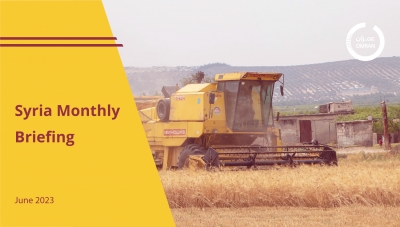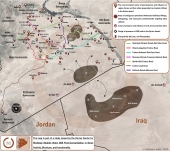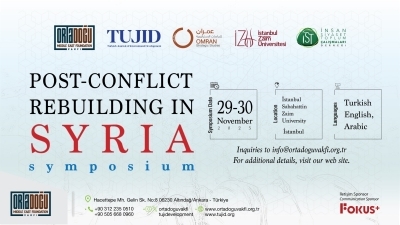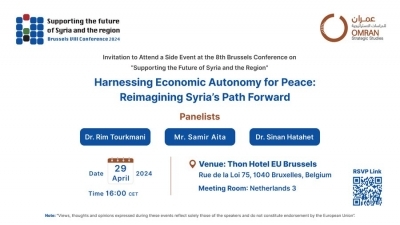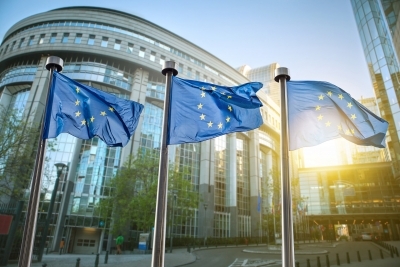Executive Summary
This report provides an overview of the key events in Syria during the month of June 2023, focusing on political, security, and economic developments. It examines the developments at different levels.
- Security and Military sector, the report highlights the following: 1) Opposition held areas in northwest Syria witnessed intensification of Russian strikes. 2) Rise in ISIS security operations in eastern Syria. 3) Increase in assassination victims, and clashes between local factions and militias associated with the regime forces in Daraa.
- Political sector, the report highlights the regime's ongoing efforts to foster closer ties with the Arab world through economic agreements, considering the Western resistance towards normalizing relations or lifting sanctions without substantial measures undertaken by the regime.
- Economic sector, the report focuses on the persistent depletion and devaluation of the Syrian pound, a consequence of the economic and financial policies pursued by the Assad regime. In the meantime, local councils and civil organizations in northwestern Syria have successfully concluded the implementation of numerous early recovery projects across several critical sectors, with particular emphasis on the industrial sector.
High indicators of security instability
In northwestern Syria, both the regime and Russia have conducted aerial and artillery bombardments in several areas in Idlib. This ongoing security and military complexity can be used as pressure to reach understandings or technical agreements, particularly due to the increased military capabilities of local actors in both regime-controlled and opposition-controlled areas. Simultaneously, Hay'at Tahrir al-Sham security forces have arrested over 80 individuals accused of engaging in dealings and espionage for hostile parties. Among those detained are notable figures from the General Security Agency and certain military brigades.
In northeastern Syria, ISIS has claimed responsibility for more than 24 attacks targeting the Syrian Democratic Forces (SDF) and their allies. These attacks resulted in the death of 11 people and left 26 others wounded. The following charts provides a comparison of ISIS attacks against the SDF between April and June for the years 2022 and 2023.
| 2022 | 2023 | Difference ratio | |
| April ISIS attacks | 34 | 13 | - 61.76% |
| May ISIS attacks | 11 | 8 | - 27.27% |
| June ISIS attacks | 17 | 24 | + 41.18% |
The Autonomous Administration in northeastern Syria has made a significant announcement. They have decided to initiate public prosecutions for approximately 10,000 ISIS operatives who are currently detained by them. This decision was prompted by the international community's delayed response to the autonomous administration's requests for assistance in repatriating their detained citizens. The trials of these operatives will be conducted in accordance with a local anti-terrorism law that was developed in 2022. While the ISIS operatives on trial will have the right to appoint their own lawyers, it has not been clarified whether the court will appoint lawyers for them. It's important to note that the death penalty is not applicable in northeastern Syria. Furthermore, Turkey persistently refused to acknowledge the Autonomous Administration, labeling it as a "terrorist" entity associated with the Kurdistan Workers' Party (PKK). In line with this stance, Turkey continued its strikes against the administration's leaders and key figures. Most recently, Turkish drones conducted an airstrike on a vehicle transporting the leaders of the “Qamishlo Provincial Council|” in the eastern part of Qamishli. The strike caused the death of the co-chair of the Council, the deputy co-president, and the driver, while the co-chairman of the council, "Kabi Chamoun," sustained severe injuries as a result of the drone strike.
Regarding Daraa, ongoing evident signs indicating the failure of the regime's efforts for reconciliations and settlements. The notable indicators include:
- Ongoing assassinations: A total of 30 individuals were killed in targeted assassinations during the month. Additionally, eight people lost their lives in other security incidents.
- Clash between local factions and pro-Assad militias near the Naseeb crossing, situated along the Syrian Jordanian border.
- Continuation of drug smuggling operations across the Jordanian border, either through the Naseeb crossing or the border strip.
The Assad regime between Arab rapprochement and western rejection
During the month of June 2023, the Syrian regime recently made several diplomatic moves. They appointed an ambassador to the Arab League, and their foreign minister visited Iraq and Saudi Arabia, resulting in an agreement to resume economic cooperation between Syria and Arab countries. Additionally, Bashar al-Assad, the Syrian leader, met with the United Nations Under-Secretary-General for Humanitarian Affairs and Emergency Relief Coordinator. During their meeting, al-Assad emphasized the importance of not politicizing the return of refugees and providing the necessary resources for reconstructing damaged structures and rehabilitating service facilities.
However, these statements by Assad also highlight the regime's refusal to address key security concerns regarding the safe return of refugees. These concerns include stopping security prosecutions against refugees, controlling, and restructuring the security services, and releasing detainees while reforming the judicial system.
It is likely that in the future, the Assad regime will continue to exploit the refugee issue to pressure the international community. Their aim is to achieve economic gains and the lifting of sanctions imposed on Syria.
In a parallel development, Canada and the Netherlands jointly lodged a lawsuit against the Assad regime at the International Court of Justice in The Hague. The lawsuit accuses the regime of torture and violations of international law, highlighting the ongoing stance of Western countries rejecting any form of normalization with the Syrian regime government.
During the recent 20th round of the Astana meetings, the final statement included several significant points. One of the key highlights was:
- Rejection of unilateral sanctions that violate international law, international humanitarian law, and the UN Charter. This statement implies the potential development of a Turkish stance favoring the lifting or easing of sanctions on the Assad regime.
- The participants at the Astana meetings expressed their approval of the regime's consent to allow aid entry through the al-Rai and Bab al-Salama crossings. This reaffirmed their opposition to any attempts to bypass the regime and Russia's approval after the extension expires in August 2023.
Current economic policies increasing Syrian’s suffering
In the Regime areas, The Syrian pound continues to experience massive declines against the US dollar, reaching a rate of 9,250 SYP per dollar. These declines are a result of the economic and financial policies implemented by the regime government. To restore stability to the currency, the Monetary and Credit Council issued a decision allowing individuals entering Syria to bring in financial revenues up to $500,000. However, those leaving the country are restricted from taking out more than $10,000 or its equivalent in foreign currency. Living conditions in regime areas remain challenging, with the population enduring rising prices during Eid al-Adha. Price increases ranged from 15% to 45%, with notable examples such as the cost of "30 eggs" reaching 30,000 SYP in Daraa and 34,000 SYP in Damascus. The price of sacrificial animals during Eid al-Adha reached 3 million SYP in certain areas, recording a 6 time increase for 2022 price. Reports indicate a significant decrease in foreign remittances to Syria during Eid al-Adha compared to Eid al-Fitr. The regime government refrained from providing any financial grants or salary increases prior to Eid al-Adha. The regime's Ministry of Finance estimated inflation rates for 2022 at 10-0% and projected a range of 10-4.7% for 2023. It is important to note that the inflation rate has reached approximately 16,000% between 2011 and 2023.
In Opposition areas, both the interim government and the salvation government have established the price of durum wheat at $330 per ton, and the price for soft wheat is set at $285 per ton. On the other hand, in areas under the Autonomous Administration, the price of durum wheat is set at $430 per ton, while in regime-controlled areas, it is set at $222 per ton.
This difference in pricing may discourage farmers in opposition areas from selling their crops to the regime or motivate them to consider alternative crops that offer higher profits, given the current pricing conditions. As part of early recovery initiatives, local councils and civil society organizations have successfully completed various projects across multiple sectors. For instance, the local council in Mare' inaugurated a new industrial city consisting of 50 operational factories and 100 others in the process of being equipped. In the city of al-Ra'i, a significant infrastructure development project, involving the establishment of a major transformer for the industrial zone, has been implemented to facilitate future projects.
In the Autonomous Administration, citizens in Hasakah protested the shortage of domestic gas, which led to its price doubling on the black market to 150,000 Syrian pounds. In Amuda market, remittance and currency exchange companies closed in objection to new licensing requirements that impose financial guarantees and office conditions beyond their capabilities. Additionally, the Customs Department has implemented a new customs system. The updated fees for shipments of vegetables and fruits are as follows:
| Item | New customs fees per ton |
| Potatoes – Tomatoes – Green Onions | 3$ |
| Onions | 10$ |
| Garlic | 20$ |
| Cherries (non-local) | 6$ |
| Bananas (non-local) | 16$ |
| Pineapple (non-local) | 60$ |
The fire brigade in al-Hasakah province has reported crop fire damage in 2023. Approximately 370 dunums of land in the countryside of al-Hasakah city and 418 dunums in al-Qamishli city have been affected.

